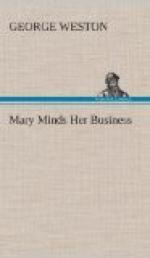“This work up here was a lucky turn for some of the strikers,” he said. “Things are getting slack again now and men are being laid off. Here and there I begin to hear the old grumbling, ’Three thousand women keeping three thousand men out of jobs.’ So whenever I hear that, I remind them how you found work for a lot of the men up here—and then of course I tell them it was their own fault—going on strike in the first place—just to get four women discharged!”
“And even if three thousand women are doing the work of three thousand men,” said Mary, “I don’t see why any one should object—if the women don’t. The wages are being spent just the same to pay rent and buy food and clothes—and the savings are going into the bank—more so than when the men were drawing the money!”
“I guess it’s a question of pride on the man’s part—as much as anything else—”
“Oh, Archey—don’t you think a woman has pride, too?”
“Well, you know what I mean. He feels he ought to be doing the work, instead of the woman.”
“Oh, Archey,” she said again. “Can’t you begin to see that the average woman has always worked harder than the average man? You ask any of the women at the factory which is the easiest—the work they are doing now—or the work they used to do.”
“I keep forgetting that. But how about this—I hear it all the time. Suppose the idea spreads and after a while there are millions of women doing work that used to be done by men—what are the men going to do?”
“That’s a secret,” she laughed. “But I’ll tell you some day—if you’re good—”
The friendly words slipped out unconsciously, but for some reason her tone and manner made his heart hammer away like that powerful downward passage of the Anvil Chorus. “I’ll be good,” he managed to say.
Mary hardly heard him.
“I wonder what made me speak like that,” she was thinking. “I must be more dignified—or he’ll think I’m bold....” And in a very dignified voice indeed, she said, “I must be getting back now. I wish you’d find the contractor and ask him when he’ll be through.”
She went down the hill alone. On the way a queer thought came to her. I sha’n’t attempt to explain it—only to report it.
“Of course it isn’t the only thing in life—that’s ridiculous,” she thought. “But sooner or later ... I guess it becomes quite important....”
CHAPTER XXX
A few hours later, Mary was sitting in her office, thinking of this and that (as the old phrase goes) when a knock sounded on the door and the elderly accountant entered.
“We have finished the first part of our work,” he said, “that dealing with factory costs. I will leave this with you and when you have read it, I would like to go over it with you in detail.”
It was a formidable document, nearly three hundred typewritten pages, neatly bound in hard covers. Mary hadn’t looked in it far when she knew she was examining a work of art.




